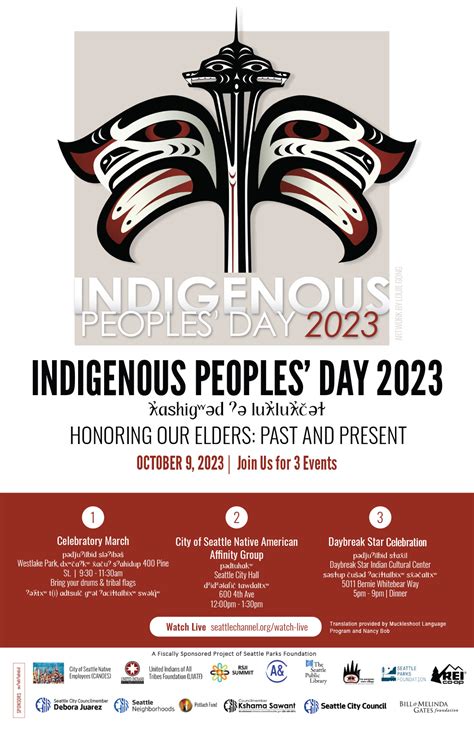Today, we commemorate Indigenous Peoples’ Day, a significant occasion that recognizes and celebrates the unique cultures, contributions, and histories of indigenous communities worldwide. As we reflect on the past and look towards the future, let us embrace the spirit of unity, respect, and collaboration that defines this special day.

Honoring the Legacy of Indigenous Peoples
Indigenous peoples have been stewards of the land for centuries, preserving its biodiversity and shaping its cultural tapestry. Their traditional knowledge, spirituality, and practices have greatly enriched human civilization throughout history.
Cultural Diversity: Indigenous communities boast a remarkable diversity of cultures, languages, and traditions. According to UNESCO, there are approximately 7,000 distinct indigenous languages spoken worldwide.
Environmental Stewardship: Indigenous peoples possess a deep connection to the natural world. They have played a crucial role in maintaining ecosystems, promoting sustainable land management practices, and safeguarding biodiversity. A study by the World Bank found that indigenous territories often have higher rates of biodiversity and lower rates of deforestation compared to non-indigenous areas.
Historical Resilience: Indigenous peoples have faced significant challenges throughout history, including colonization, forced assimilation, and discrimination. Despite these obstacles, they have demonstrated extraordinary resilience and continue to thrive and innovate within their communities.
Embracing the Contributions of Indigenous Peoples
Indigenous peoples have made invaluable contributions to society in various fields, including art, music, literature, and science.
Art and Culture: Indigenous art is renowned for its vibrant colors, intricate designs, and profound spiritual significance. From traditional paintings to contemporary installations, indigenous artists express their cultural heritage and worldview through their creations.
Music and Dance: Indigenous music and dance traditions are a vital part of community identity. These expressions often tell stories, commemorate historical events, and celebrate spiritual beliefs. For example, the powwow is a sacred gathering where indigenous peoples from different nations come together to share their culture through dance and music.
Science and Knowledge: Indigenous peoples have developed a vast body of traditional knowledge related to plants, animals, and the environment. This knowledge has been passed down through generations and continues to inform modern scientific research and conservation efforts.
Securing a Vibrant Future for Indigenous Peoples
As we celebrate Indigenous Peoples’ Day, it is crucial to recognize the ongoing challenges faced by indigenous communities worldwide. To ensure a vibrant future for these communities, we must work together to:
Promote Education and Healthcare: Equitable access to education and healthcare is essential for improving the well-being of indigenous peoples. Governments and organizations should invest in programs that support indigenous languages, cultural practices, and traditional healing systems.
Support Economic Empowerment: Indigenous peoples often face barriers in accessing economic opportunities. Providing access to land, resources, and training can empower communities to achieve economic self-sufficiency and preserve their cultural heritage.
Protect Cultural Rights: The preservation of indigenous cultures is essential for their continued existence. Governments should support the protection of sacred sites, traditional knowledge, and intellectual property rights.
Foster Dialogue and Collaboration: Open communication and mutual respect are fundamental to building strong relationships between indigenous peoples and non-indigenous societies. Engaging in dialogue and collaborative decision-making can lead to more just and equitable outcomes.
Celebrating Indigenous Peoples’ Day: A Way Forward
Indigenous Peoples’ Day serves as a reminder of our shared history and the enduring contributions made by indigenous communities. By honoring the past, embracing the present, and securing a vibrant future for indigenous peoples, we create a more just and harmonious society for all.
Common Mistakes to Avoid:
- Stereotyping: Indigenous peoples are not a monolithic group. Avoid making assumptions or generalizations about their culture or lifestyle.
- Dismissing Indigenous Knowledge: Traditional knowledge and practices have valuable insights that can contribute to scientific understanding and conservation efforts.
- Ignoring Contemporary Issues: Indigenous communities continue to face challenges such as discrimination, poverty, and environmental degradation. Address these issues to create meaningful change.
Why Indigenous Peoples’ Day Matters:
- Recognizing Diversity: Celebrating Indigenous Peoples’ Day promotes understanding and appreciation of the diversity of human cultures.
- Fostering Inclusivity: Recognizing the contributions of indigenous peoples creates a more inclusive society where all voices are valued.
- Protecting Human Rights: Safeguarding the rights and well-being of indigenous peoples is essential for ensuring their continued existence and flourishing.
Benefits of Indigenous Peoples’ Day:
- Education and Awareness: Commemorating Indigenous Peoples’ Day helps spread awareness about their cultures and histories.
- Community Building: This day strengthens bonds within indigenous communities and fosters a sense of common purpose.
- Policy Change: Raising awareness about indigenous issues can influence policy decisions and lead to more equitable outcomes.
Closing Remarks
Indigenous Peoples’ Day is an opportunity for us to reflect on our shared past, celebrate the invaluable contributions made by indigenous communities, and commit to securing a vibrant future for them. It is through collaboration, respect, and meaningful engagement that we can create a just and sustainable society for all.
To further our understanding and appreciation of indigenous cultures, here are some additional resources:
- United Nations Department of Economic and Social Affairs: Indigenous Peoples
- World Bank: Indigenous Peoples
- National Congress of American Indians
